Here are the Best Personal Training Certifications in 2024
- Best overall: ISSA – International Sports Sciences Association (Check ISSA Pricing)
- Best for private & online trainers: FM – Fitness Mentors (Check FM Pricing)
- Most respected: NASM – National Academy of Sports Medicine (Check NASM Pricing)
- Best holistic approach: ISSA – International Sports Sciences Association (Check ISSA Pricing)
- Lowest cost: FM – Fitness Mentors (Check FM Pricing)
- Best for training athletes: NCSF – National Council on Strength & Fitness (Check NCSF Pricing)
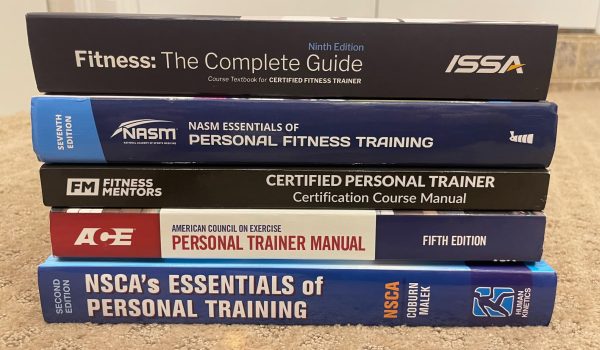
With multiple certification options available, myself and the team here at Fitness Mentors wanted to clearly state the pros and cons of each certification based on their cost, customer support, curriculum, pass rate, and accreditation.
By the end of this article, you will have learned the main features and benefits of the best personal training certifications and be able to choose and learn how to get the personal training certification that fits your needs.
If you feel like you need assistance in choosing the best personal training certification for you, launch our quiz below.
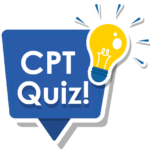
What Cert is Best for You?
We designed this quiz to help you choose the perfect certification based on your learning style and goals.
Why I am qualified to recommend top personal trainer certifications

Hi, I’m Eddie Lester, the founder and CEO of Fitness Mentors. I’ve been a personal trainer for nearly 20 years and have 10 personal training certifications. In addition, I used to be a personal trainer certification teacher at a vocational college making me highly familiar with the educational materials and learning styles of each major CPT body and prospective students, respectively.
The contents of this article have also been reviewed by Alex Cartmill and Matt McLeod, both of which are experienced personal trainers holding multiple personal training certifications themselves, as well as having more than 10 years of training experience.
I am excited to share with you my analysis of the best personal trainer certifications that will specifically cover:
- Certification cost
- Exam and curriculum contents
- Exam pass rates
- Accreditation status
- Overall rating
Best Personal Training Certification Reviews
Best overall
International Sports Science Association (ISSA)
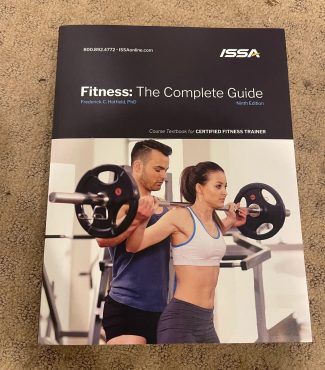
COST
support
CURRICULUM
DIFFICULTY
OVERALL
Pros
- High exam pass rate
- Highly-rated support
- Modest CEU requirement
Cons
- Cost
- NCCA accredition requires additional exam
Summary: I’ve weighed factors such as accreditation, price, curriculum, CEU requirements and more to provide this review of ISSA. With all of these factors considered (and more weight placed on certain factors such as cost and curriculum), ISSA is our current top pick for the best personal training certification for 2023.
Their certification provides a job placement guarantee, sets you up to train in-person and in online environments, and is the most highly rated certification as indicated by third-party reviews on this list.
ISSA Most Commonly Considered Factors:
- Cost: $828 with most popular package at $1199
- Exam Pass Rate: 72% of students pass on their first attempt (2022 data)
- Exam Passing Score: 70%
- Suggested Study Timeline: 3 months
- Accepted at Gyms: Yes, accepted at all gyms
- NCCA Accredited: Yes
ISSA stands for The International Sports Sciences Association. Founded in 1988 by a team of fitness experts and exercise scientists, their personal training certification is recognized worldwide.
Once a student takes and passes the ISSA exam, which covers a wide array of fitness topics, you are qualified to offer fitness and personal training services. Exam topics include Anatomy & Physiology, Kinesiology and Biomechanics, Health and Physical Fitness, Nutrition, and General Fitness.
The ISSA CPT is my top pick for a personal trainer certification program compared to other options available for a number of reasons.
First off, the ISSA’s certification program places a strong emphasis on both theoretical and practical knowledge in the personal training field. This includes an extensive curriculum that covers topics such as nutrition, program design, exercise science, and business principles.
Moreover, the ISSA CPT also provides an opportunity to get a certification by the National Commission for Certifying Agencies (NCCA), the gold standard in certification bodies. Such an accreditation may lend additional credibility to the certification in the eyes of prospective clients or employers.
Furthermore, the ISSA provides a range of specialized certifications in areas such as corrective exercise, strength and conditioning, and fitness nutrition. This may appeal to individuals who seek to develop their skills and knowledge in a particular area of personal training.
Finally, my experience with the ISSA staff has be far better than dealing with other certification bodies. This really matters when you begin your studies and are looking for support like I was. Also, the ISSA offers ongoing resources and support to its certified personal trainers, such as access to a network of professionals in the fitness industry and opportunities for continuing education. Such assistance can enable trainers to remain current with the latest trends and research in their field and may contribute to their success as personal trainers.
The initial part of the curriculum focuses learning the sciences necessary to understand the human body. They then shift to focus on teaching you how to help your clients through exercise programming. You’ll learn all the major muscle groups and unique ways to build workout routines.
Additionally, they help you learn to guide your clients through specific exercises ensuring proper form to minimize the risk of injuries. This content helps to build a valuable foundation for aspiring personal trainers.
ISSA places less emphasis on corrective exercise specialization and screening, but some these topics are addressed in the client screening segment.
When it comes to aerobic training, ISSA equips you with fundamental tools to create training programs based on relative intensities of different client ability levels.
In terms of special populations training, ISSA accels in covering the diverse needs of different client demographics. If you’re employed in health clubs, encountering and training clients that fall into the special populations category is inevitable.
One area where I feel ISSA could improve is in addressing behavioral change, a crucial aspect when working with clients resistant new to forming health and exercise habits.
In my opinion, the ISSA curriculum provides a great spring board from which to start and build your personal training career.
Most respected
National Academy of Sports Medicine (NASM)
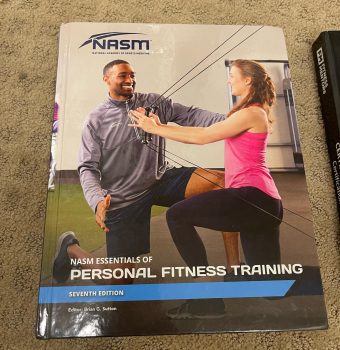
COST
support
CURRICULUM
DIFFICULTY
OVERALL
Pros
- NCCA accreditated
- Most prestigious cert
- Trainer salaries rank highly
Cons
- Expensive cert
- Exam retake fee
Summary: As an aspiring personal trainer, there is a good chance you’ve considered a NASM certification to add to your list of professional accolades.
There’s good reason too, NASM is considered to be a global leader in credentialing fitness professionals, and their wealth of certifications will prepare you for a promising career in personal training or one of their other areas of specializations.
NASM Most Commonly Considered Factors:
- Cost: $849 (FM Exclusive) with most popular package at $1499
- Exam Pass Rate: 79% (Proctored), 90% (Non-Proctored) of students pass on their first attempt (January 2024 data)
- Exam Passing Score: 70%
- Suggested Study Timeline: 4 months
- Accepted at Gyms: Yes, accepted at all gyms
- NCCA Accredited: Yes (Proctored Exam), No (Non-Proctored Exam)
Starting at $849
NASM stands for the National Academy of Sports Medicine, a 30-year old company best-known for their Certified Personal Trainer (CPT) program. Within the last 10 years, NASM has certified and recertified more personal trainers than any other personal training company, helping nearly 200,000 obtain, or maintain, their CPTs all across the globe.
NASM is also NCCA-accredited, meaning they have the National Commission for Certifying Agencies credentials, the first standards ever developed to ensure a fitness certification body has the essential elements of a high-quality program.
I really stand behind the training model that NASM created called the Optimum Performance Training (OPT™) model. This is a comprehensive training system that is heavily versed in scientific, evidence-based research. According to NASM, the emphasis on science makes OPT ideal for program design and delivering consistent results. I currently use it to program my clients workouts and it works great and really helps me program effectively.
To dive a little deeper into why I use the OPT Model and explain what it is, the OPT Model is a comprehensive training framework designed to enhance the effectiveness and efficiency of exercise programs.
It is structured into three progressive phases: Stabilization, Strength, and Power, which I love as these are the backbone of achieving fitness goals. Here is a bit more about the model:
Stabilization Phase (Phase 1): This initial stage focuses on developing stability and neuromuscular efficiency to address imbalances and improve core function. Exercises emphasize controlled, coordinated movements to enhance joint stability and postural control.
Strength Phase (Phase 2): Building upon the foundation established in the stabilization phase, the strength phase aims to increase muscle strength, endurance, and overall lean body mass. Resistance training is a key component, with an emphasis on multi-joint exercises and progressive overload.
Power Phase (Phase 3): The final phase is dedicated to maximizing power and athletic performance. It integrates the gains from the previous phases into dynamic, explosive movements to enhance speed, agility, and power output.
The above stages help me program my client’s workouts using systematic progression and ensure a safe and effective exercise session. This approach allows for individualized program design based on the client’s goals, fitness level, and any specific needs or limitations. The OPT Model serves as a versatile guide for fitness professionals to tailor programs for clients across various fitness levels and objectives.
The NASM CPT curriculum starts off by discussing the personal training profession including professional development.
It then shifts to teach the necessary skills to help your future clients adhere to exercise behaviors through coaching techniques and exercise psychology.
NASM leans heavy into the sciences of exercise which can be overwhelming for some. They focus almost two hundred pages of the textbook on the human movement system, the cardiorespiratory system, kinesiology, exercise metabolism, and nutrition.
They then dive deep into health and exercise assessments followed by teaching you how to perform exercises with proper form and technique. they finish with a strong section on program design, which I really enjoy to teach, that focuses on the OPT model I mentioned in the section above.
Overall this curriculum is one of the best out there, but can be a bit intimidating as the textbook has over 900 pages! Either way I always recommend NASM as a top option.
Best for private & online trainers, & lowest cost
Fitness Mentors
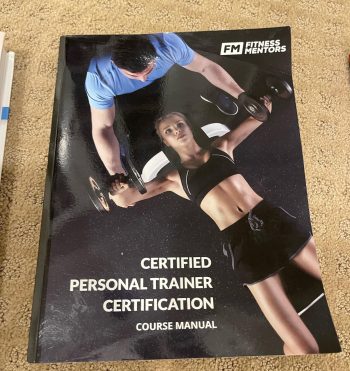
COST
support
CURRICULUM
DIFFICULTY
OVERALL
Pros
- Best cert for training online
- Lowest cost cert
- Best customer support
Cons
- Not as well known as other certs
- No in-person exam options
Summary: Originally known as a study guide provider for NASM and ACE, Fitness Mentors decided that it was time to provide better value to the personal trainer of today. This meant creating an original curriculum and certification that catered to private trainers, online trainers and trainers who sought an entrepreneurial route with a focus building a lifelong career.
With a certification focused on mastering all the roles of a personal trainer – business owner, coach, salesman, and mentor – it is unique in that it is specifically catered towards program design and business success. As the lowest cost personal trainer certification, it is also a viable option for those looking to get started at a lower investment.
Fitness Mentors Most Commonly Considered Factors:
- Cost: $499 with the most popular package being $729
- Exam Pass Rate: 92% of students pass on their first attempt (2022 data)
- Exam Passing Score: 70%
- Suggested Study Timeline: 2 months
- Accepted at Gyms: Yes, accepted at most gyms
- NCCA Accredited: Included with $729 package and above
The Fitness Mentors CPT is the new kid on the block in terms of training certifications, giving it an edge in terms of curriculum without the brand recognition of the bigger players.
It is known for being the best value certification around, while boasting the highest exam pass rate due to the company’s background in education. What separates Fitness Mentors’ certified personal trainer certification is their excellent customer service and included lifetime expert guidance as well as business coaching.
It is Fitness Mentors’ view that to be a successful personal trainer today, they need to know program design and fitness fundamentals, but also important business growth and marketing principles. Whereas other programs tend to focus on programs and exercise physiology, Fitness Mentors provides that education and more at an unmatched price and with human support.
The Fitness Mentors CPT curriculum starts off by diving into fitness assessments as a platform for creating a safe and effective exercise program.
Next they move into the sciences behind exercise and training including anatomy, physiology, kinesiology and exercise science.
The next chapters focus on creating effective exercise programs for any fitness goal. They utilize the FORM model of training to encourage proper form and technique before adding heavier resistance.
Fitness Mentors leans heavy into business building elements of the personal training career. They focus almost one hundred pages of the textbook on how to establish your business, market and sell your services, and get paying clients. FM provides the most education on business and how to make money as a personal trainer, something very important to establishing a career in fitness.
They finish strong with a comprehensive nutrition and supplements section, focusing on helping trainers aid their clients in proper nutrition strategies for weight loss, muscle gain, and athletic performance.
This curriculum is very thorough but also significantly more to-the-point of personal training and cuts a lot of unnecessary information utilized by other certifications. The emphasis on business and entrepreneurship makes this certification a must for those looking to start their own business online or as a private personal trainer.
Best for training athletes
National Council on Strength & Fitness
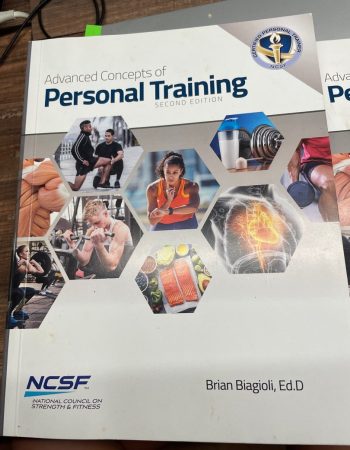
COST
support
CURRICULUM
DIFFICULTY
OVERALL
Pros
- NCCA accreditated
- Best education for training athletes
- Very relaxed continuing education requirements
Cons
- Challenging exam
- Second-rate study materials
Summary: The National Council on Strength & Fitness (NCSF) is an NCCA accredited certification from a reputable company known for its focus on exercise prescription and programming considerations. They are middle of the road in terms of cost and amongst the lowest in terms of exam pass rate.
A popular choice amongst those who don’t enjoy continuing education, their 10 hours every two years makes them a strong consideration from a time and investment perspective.
NCSF Most Commonly Considered Factors:
- Cost: $799 with most popular package at $1399
- Exam Pass Rate: 79.76% of students pass on their first attempt (2021 data)
- Exam Passing Score: 70%
- Suggested Study Timeline: 3-6 months
- Accepted at Gyms: Yes, accepted at all gyms
- NCCA Accredited: Yes
The National Council on Strength & Fitness (NCSF) CPT is a globally recognized certification that is known for its emphasis on training athletes.
With both online and in-person exam options, they boast the industries largest exam network that encompasses over 160 countries. This network is popular amongst trainers outside the United States who want to be sure their credentials are respected wherever they are in the world.
Additionally, NCSF maintains memberships with industry-leading health clubs, facilitating career opportunities for trainers who are focused on gym environments.
I feel NSCF is a great option if you are looking to train athletes as their curriculum and Strength Coach certification has curriculum that specifically focuses on this type of clientele.
The curriculum begins with an “Introduction to Personal Training,” providing a foundational understanding of the field. It then delves into “Functional Anatomy and Training Instruction,” crucial for trainers to comprehend the mechanics of the human body and how to instruct exercises effectively. “Kinetic Chain Function, Dysfunction, and Corrective Exercise” follows, focusing on identifying and addressing movement imbalances.
Moving deeper, “Human Physiology” explores the physiological mechanisms underlying exercise responses. “Evaluating Health and Physical Fitness” and “Physical Activity and Risk for Disease” emphasize the importance of assessing clients’ health status and mitigating health risks through physical activity.
“Resting and Active Fitness Assessments” provides tools for assessing fitness levels accurately. Understanding the role of “Nutrition” and “Dietary Supplements” is vital for trainers to support clients in achieving their fitness goals.
Chapters on “Body Composition” and “Weight Management” address key aspects of physique and weight control. “Exercise Program Components” and “Anaerobic Resistance Training” detail the components and methodologies of effective exercise routines.
“Cardiorespiratory Fitness” and “Flexibility” cover essential elements of overall fitness. “Introduction to Exercise Programming” provides a framework for designing tailored workout plans.
Finally, “Working with Special Populations” addresses considerations for training diverse groups, ensuring inclusivity and effectiveness in personal training practice.
Best holistic approach
American Council on Exercise (ACE)
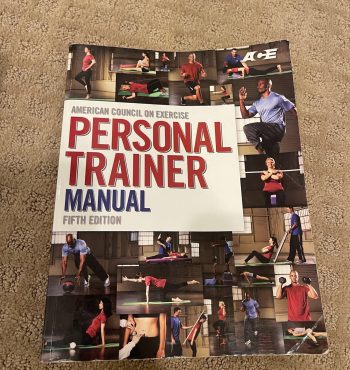
COST
support
CURRICULUM
DIFFICULTY
OVERALL
Pros
- NCCA accreditated
- Novel holistic education program
- Generous study period
Cons
- One of the most expensive certs
- Second-rate study materials
Summary: ACE is NCCA accredited, meaning the National Commission for Certifying Agencies has identified its coursework as reputable and meets the criteria for what is considered a high-quality program within the personal training industry.
This also means that this CPT gives you a high likelihood of getting you a job within a gym.
ACE Most Commonly Considered Factors:
- Cost: $675 with most popular package at $745
- Exam Pass Rate: 72% of students pass on their first attempt (2022 data)
- Exam Passing Score: 70%
- Suggested Study Timeline: 4-6 months
- Accepted at Gyms: Yes, accepted at all gyms
- NCCA Accredited: Yes
Starting at $675
The American Council on Exercise (ACE) CPT is one of the most popular of the personal trainer certifications, with our research indicating that there are over 13,100 tests taken each year.
The cost of ACE’s study materials and test fall more in the moderate range, which in my opinion provides good value.
While slightly more expensive up front, ACE looks to be a good investment as the average income of an ACE personal trainer is amongst the best in the industry, which you’ll see in my analysis further down this page.
ACE also has modest continuing education (CEU) requirements. Trainers are required to take 20 hours of CEUs and the current cost is $129 to recertify every 2 years.
The ACE curriculum begins with an exploration of the “Role and Scope of Practice for Personal Trainers,” establishing professional standards and responsibilities. It then introduces the “ACE Integrated Fitness Training Model,” a comprehensive approach to designing fitness programs.
“Basics of Behavior Change” and “Effective Communication, Goal Setting, and Teaching Techniques” equip trainers with skills to motivate and guide clients effectively. “Preparticipation Health Screening” ensures safety by assessing clients’ health status before exercise.
Nutrition’s role in “Health and Fitness” is covered extensively, followed by “Resting Assessments and Anthropometric Measurements” to gauge baseline fitness levels accurately.
Chapters on “Cardiorespiratory Training” and “Muscular Training” delve into the physiology, assessments, and programming techniques for these fundamental aspects of fitness. Integrated exercise programming, evidence-based practice, and considerations for diverse populations, including those with obesity, chronic diseases, and musculoskeletal issues, are thoroughly addressed.
“Legal Guidelines and Business Considerations” conclude the curriculum, educating trainers on legal and business aspects of personal training practice, ensuring they operate ethically and effectively in their profession.
What to look for when choosing a personal trainer certification

Watch Our Video: Best Personal Trainer Certification
- Accreditation: most gyms only accept personal training certifications that are NCCA, NBFE or DEAC – recognized so this is an important factor for aspiring trainers. These certifying bodies are considered the gold standard for fitness certifications.
- Price: includes the cost of the test and the cheapest study materials.
- Pass Rate: the total test takers divided by the passers.
- Expected Study Time: this is the time you have to take the exam from the time you purchase the study materials.
- Number of Test Questions: all tests are multiple choice, and we report on the amount of test questions for each exam. We also cover the total time allotted as well as the minimum passing score.
- CEU Requirements: amount of Continuing Education Units required to maintain certification.
- Popularity of Certification: indication of the amount of people who have a cert and take the test every year.
- Primary Focus of Education: while this topic may surprise some, each program varies slightly in what their education process concentrates on teaching you. This information is pulled straight off their catalogs.
- Average Income: average annual income from reputable sources.
- Retake Fee: if you fail the exam the first time, the price to retake the exam again.



Want to know which certification is right for you? Take our Quiz by clicking here.
Check out our infographic that covers the objective items mentioned above. Below the image is a list of all the items with a breakdown.
Best Personal Training Certification: An Objective Look into 10 Key Criteria
Below we summarize the data contained in the infographic, diving into highlights from each section, explaining why some companies vary so much, and giving an honest assessment of why each of the companies ranks where it does.
We also include a “Personal Trainer Takeaway,” from me, a longtime personal trainer who has worked in almost every facet of the business (big box gym, one-on-one, group fitness, business owner, etc.). This section is a bit more subjective, but will help you consider some things that a purely objective analysis might not.
In some instances, we were not able to find data for each of the certifying bodies and we made estimates. This estimated data is not presented in the infographic but we make mention of it here.
Accreditation
Accreditation standards are developed by several third-party credentialing organizations to maintain a level of professionalism within the fitness industry. These designations showcase that a certification body has created a high-quality program that ensures the safety and wellbeing of the public. Fitness certifications that wish to be accredited have to submit their programs and final exam to be evaluated on an individual basis. This ensures that they meet the highest standard and validates that the aspiring trainer has the competency for entry level employment.
With the exception of AFAA, every personal training certification body on this list has the option for a National Commission for Certifying Agencies (NCCA) accredited exam, which is the gold standard for fitness certifications. This is important to trainers because most gyms will only accept personal trainer certifications that are accepted by an NCCA-accredited body. So, if you are like many trainers who want to jumpstart their career by working in a gym, you may want to avoid a cert that is not NCCA-accredited.
If you are looking for a more entrepreneurial route other than working in a gym, the FM-CPT is known for having the most business emphasis in their education. ISSA does have additional accreditation with Distance Education Accrediting Commission (DEAC) and National Board of Fitness Examiners (NBFE), and is accepted at most gym chains.
Personal Trainer Certifications with the option for NCCA Accreditation:
- ISSA
- Fitness Mentors
- NASM
- ACE
- NSCA
- ACSM
- NESTA
- NCSF
- NFPT
Personal Trainer Certifications with National Board of Fitness Examiners (NBFE) Affiliation
- Fitness Mentors
- ISSA
- NESTA
Personal Trainer Certification with DEAC Accreditation:
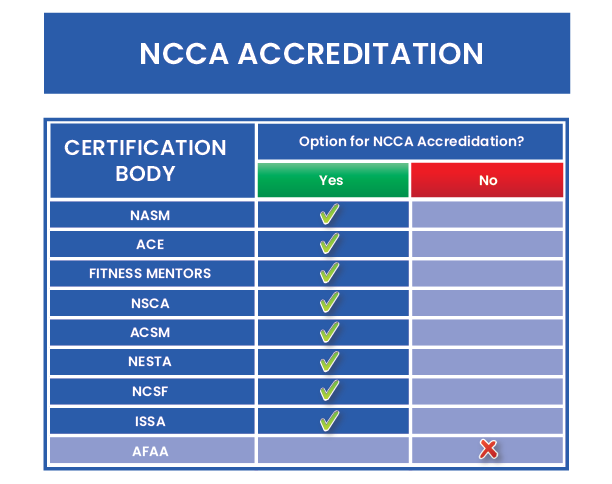
Personal Trainer Takeaway:
Be sure to check with your top employment options to find out which certifications they accept, as that may limit your certification choices. For example, if you have a friend that works at 24-Hour Fitness and says he can get you a job if you get certified, get a list of the certifications they honor so you know you’ll be a shoe-in.
Similarly, if you plan on working at a smaller shop with other personal trainers, inquire with them first if they will accept the personal training certification you are leaning towards. Bottom line, determine where you want to work, then see if those places have requirements on the types of PT certs they accept for employees.
Price
Most of the personal trainer certification bodies prices start between $500 to $850 for the exam and the study materials. Many of these companies offer periodic discounts, and some offer membership pricing.
For the least expensive yet highly reputable option, the Fitness Mentors CPT at $499 is a popular option. The only other sub-$500 option is NCSF as they sometimes offer large discounts.
NASM is an expensive option, but frequently goes on sale. ACE is also on the upper end of the pricing spectrum, but they too offer frequent promotions.
A great tool I have used is to utilize a 12 month payment option as it spreads the price out over a longer period of time.
Prices listed are non-promotional, full-price, non-member prices.
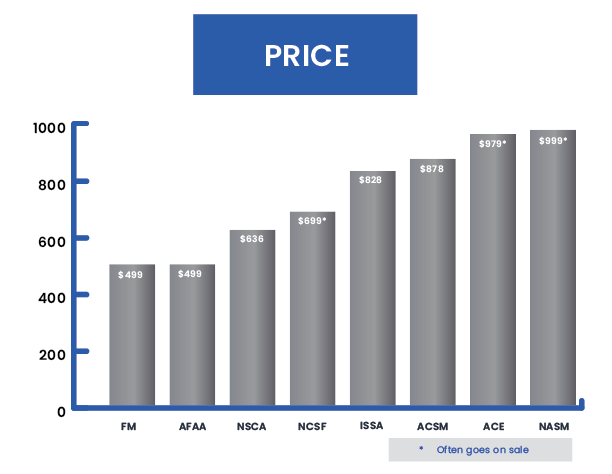
Personal Trainer Takeaway:
You should determine what matters most to you: prestige or cost? If you want to go with a more recognized name in the industry (NASM, ACE) it will cost more. If you only need an inexpensive, accredited certification for quick employment or for the entrepreneurial route, look toward the less expensive certifications (Fitness Mentors, AFAA).
However, also consider CEU requirements, income, as well as the above accreditation factors before you pull the trigger. While price may be the most important factor to you, all the factors on this page may influence your final decision beyond your initial investment.
Pass Rate
The cert with the best pass rate is Fitness Mentors at 92%, while ACSM, at 55%, sits on the bottom end.
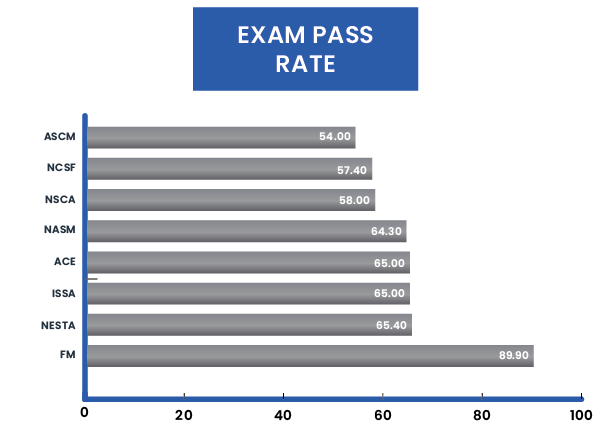
Personal Trainer Takeaway:
Some tests are much harder than others. If we use pass rate as our main reference point, it would appear that ACSM, NSCA, and NCSF have the most difficult tests. This can mean these tests are the hardest to pass or the educational experience provided is not sufficient in preparing students for the subject matter on the test.
Or, it could mean these tests tend to focus on more difficult subjects like anatomy, physiology and biomechanics. The study experience — books, study guides, practice exams, access to instructors, etc. — from fitness organizations can vary widely. The feedback from students is that some study curriculum does not fully prepare a student for a final exam as well as it could, while others find that the preparation materials provided fully prepare them for the final exam. This is why students often use third-party educators like Fitness Mentors to provide education for multiple certification exams like NASM and ACE.
Expected Study Time
The expected study time is inferred from the time the certification bodies give you when you buy the study materials until the time you have to take the exam.
Fitness Mentors: 6 Months with 80 hours of recommended study time.
NESTA: Study as long as you need but must complete the test within 90 days of requesting the exam voucher.
ACSM: 3, 6, 12, or 24 month options.
ACE: Schedule test before 6 months of purchase ends but can take it before 9 months.
ISSA: 6 months to complete.
NASM: Must complete in under 6 months.
NCSF: Must complete in under 6 months.
NCSA: 120 days after purchasing exam.
NFPT: 12 Months after purchasing exam.
Personal Trainer Takeaway:
The timeline you have to complete the test matters depending on your situation. Are you currently unemployed and need a training job as soon as possible? You would then want the shortest study time and easiest test. Are you looking to become certified without the need for immediate employment? Maybe a longer study time would be needed since you are less motivated for immediate results. Also, keep in mind how much time you have to put toward your studies? If you only have two hours a week, you may not be able to complete your studies in the allotted time.
The main takeaway here is to not just look at the exam with the least amount of study time and say, ‘that’s for me!’ Instead, take an honest assessment of your current financial situation and the certification you really want and make the best decision for your future.
Number of Test Questions
Below: Number of test questions / total test time / minimum passing score
Fitness Mentors: 100 questions / 120 minutes / 70% or higher is passing
NASM: 120 questions (100 count towards your score) / 120 minutes/ 70% or higher is passing. NASM now also offers a 100 question non-accredited test with a 3 hour timelimit.
ACSM: 120 questions / 120 minutes / 68.75% or higher is passing. 800 points available based on scaled questions, 550 points needed to pass
AFAA: 120 questions online exam / 120 minutes / 70% or higher is passing
NFPT: 120 questions online exam / 120 minutes / 70% or higher is passing
NESTA: 125 Questions / 120 minutes / 69% or higher is passing
NCSF: 150 questions / 180 minutes / 62% or higher is passing
ACE: 150 questions / 180 minutes / 62.5% or higher is passing. 800 points available based on scaled questions 500 points needed to pass
NSCA: 155 questions / 180 minutes / 70% or higher is passing
ISSA: 120 questions / unlimited time / 70% or better is passing
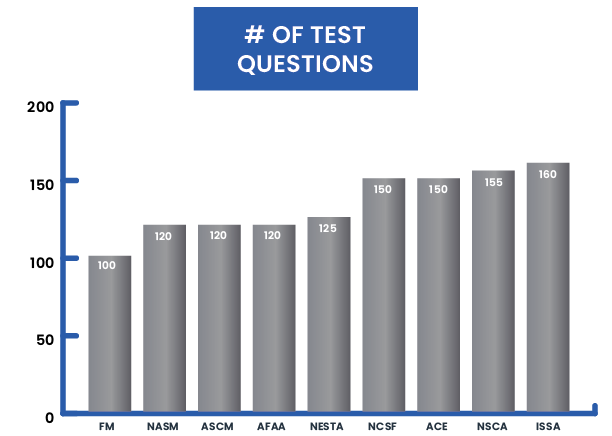
Personal Trainer Takeaway:
What type of test taker are you? A confident test taker will not need to worry about the length of test or number of questions. Someone whose mind goes blank because of testing anxiety may want to consider the shorter test like Fitness Mentors, NASM or ACSM. Or, if you have an extreme fear of tests consider Fitness Mentors or ISSA as the tests are open book. Just make sure your potential employer approves this certification.
CEU Requirement
The NCSF has by far the least amount of CEUs required at 10 credit hours. At the other end, NSCA trainers are required to obtain 60 CEUs. However, these numbers alone don’t tell the whole story, you should also consider the time periods in which these hours are required, as well as the costs to recertify.
Fitness Mentors: 20 hours of CEUs and $99 to recertify every 2 years
NCSF: 10 hours of CEUs and $50 to recertify every 2 years
AFAA: 15 Hours of CEUs and $99 to recertify every 2 years
NASM: 20 hours of CEUs and $99 to recertify every 2 years
ACE: 20 hours of CEUs and $129 to recertify every 2 years
ISSA: 20 hours of CEUs and $99 to recertify every 2 years
NESTA: 40 hours of CEUs and $149 to recertify every 4 years
ACSM: 45 hours of CEUs and $30 to recertify every 3 years
NFPT: 10 hours of CEUs and $50 to recertify every year
NSCA: 60 hours of CEUs and $50 to recertify every 3 years
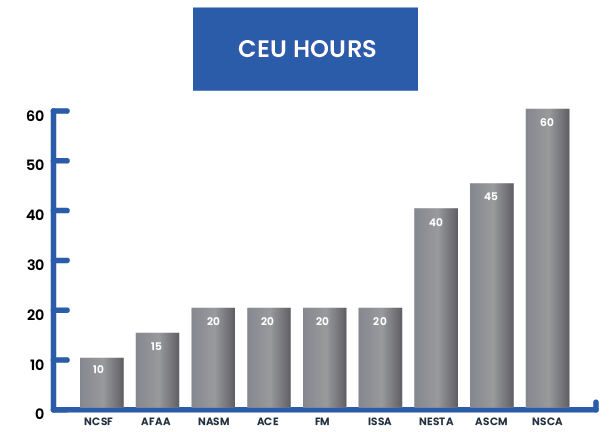
Personal Trainer Takeaway:
Recertification is required by all certifying bodies. The process of recertification varies slightly, but one common ground is that they require you to continue your education and show proof of this newly obtained knowledge via CEUs or Continuing Education Units.
Also, there are typically 1,000s of courses to choose from to continue your education and we have compiled a list of our favorites here. Another consideration is that the more CEUs that are required by a provider the more money you will spend on recertifying (roughly $20 per contact hour) which makes NSCA (60 hours) and ACSM (45 hours) less appealing financially. Hopefully, this will not matter if you are successful in your personal training career. To ensure that you are successful check out this highly recommended business and sales course for personal trainers.
Popularity of Certification
The popularity of a certification is based on the number of trainers with a specific cert in the field as well as the number of test takers per year. Not reported in the graph is the number of tests taken per year.
The number of tests taken per year is provided below:
NASM: 31,385 (2021 data)
ACE: 11,835 attempts per year (2022 data)
ISSA: 10,696 attempts per year
NFPT: 2,684 attempts per year
NCSF: 1,723 attempts per year
NSCA: 1,529 attempts per year
NESTA: 1,515 attempts per year
ACSM: 1,386 attempts per year (2022 data)
Fitness Mentors: 636 attempts per year
Personal Trainer Takeaway:
The way that we look at this statistic is mainly by determining the recognition for each certification body. It is assumed that the more people that take a certification the more well-known that certification is. Popularity can be seen as a reputation builder meaning that more people trust that company, but it also can be determined by the volume of marketing and advertising a company puts in.
To give a brief example of this, NASM advertises on TV and radio in our local area. This leads to more people in general recognizing the NASM brand and name. When trainers say they are NASM-certified, their clients typically recognize the brand name because of the abundant advertising and that makes the trainer more reputable, even though the client knows nothing about the quality of education NASM provides.
On the other hand, some progressive companies, like Fitness Mentors, have introduced a relatively new certification. For this reason, they don’t yet have the same number of tests taken as organizations that have been around for dozens of years. The benefit of some of the newer certifications, however, is that they are able to fill voids where some of the older organizations lag. Fitness Mentors is 100% online, boasts more study materials than many of the other certifications, offers personal mentorships, and provides access to instructors. ISSA is also a 100% online option, rounding out the more progressive companies that are keeping up with modern demands of trainers who capitalize on online learning and test-taking.
The question you must ask is ‘do I care if my clients recognize the name of my certification?’ If so, choose a certification with more popularity. Just keep in mind that most clients don’t know and don’t care what certification you have, but employers do so make sure your chosen employer accepts the cert.
Primary Focus of Education
This information was taken straight off the catalogs of the certification bodies.
Fitness Mentors: Fitness Program Design and Business Success
ISSA: Fitness Program Design
NASM: Rapport & Client Relationship Building, Exercise Technique & Instruction
ACE: Behavioral Modification for Fitness Goals
NSCA: Techniques of Exercise
ACSM: Exercise Leadership and Client Education
NESTA: Business Applications
NCSF: Exercise Prescription and Programming Considerations
NFPT: Goal-oriented Program Design in User-friendly Format
Personal Trainer Takeaway:
Most of the certifying bodies will be very similar in their balance of educational topics, due to the NCCA regulation that forces companies to do a Job Task Analysis. This Job Task Analysis determines the most important knowledge to have to be successful in the field and is typically the same across the board. Therefore, each company is required to have the same topics of education.
Average Income
Personal Trainer Takeaway:
We know trainers that make $200,000 per year as well as $20,000 per year all of which have the same and/or different certifications. Your success as a business person is determined by your drive, knowledge of key business and sales techniques, location and various other things. To find out how to optimize your success we recommend this online course.
Also recently Online Personal Training has lead to a larger population of trainers making $100,000 or more. To become certified to train online and learn how to make six-figures we recommend this certification.
Retake Fee
Should you fail the exam the first time around, most certifications bodies charge to retake it. NSCA, the provider with the most expensive retake fee ($435), charges almost eight times more than the cheapest provider Fitness Mentors ($50), while the bulk of the other providers are in the $100 to $200 range. UPDATE: ISSA does offer a free retest with their packages.
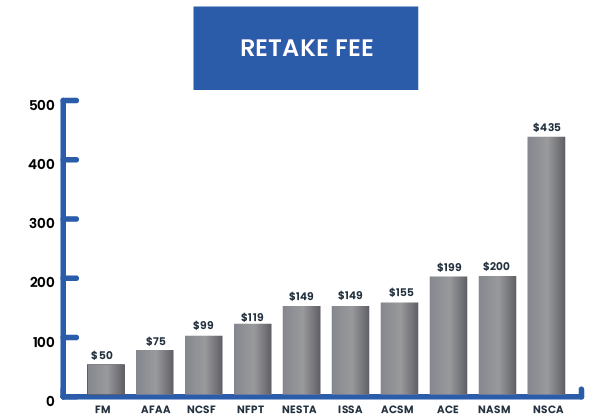
Personal Trainer Takeaway:
The takeaway here is to prepare for whatever test you take, and make sure you pass the first time around!
Who to Pick for the Best Personal Training Certification
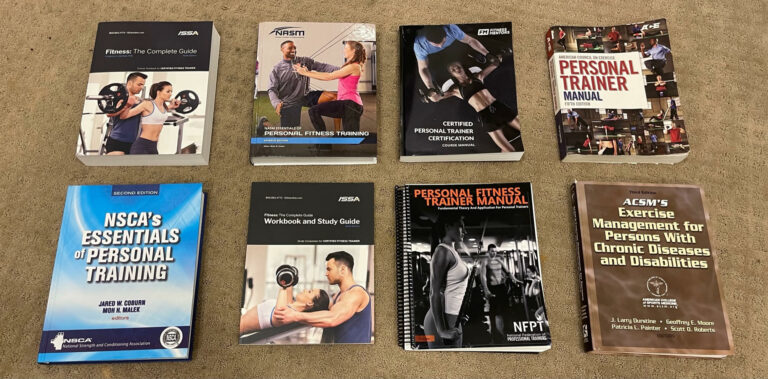
Again, choosing a personal training certification is a very subjective decision and certain factors may weigh more heavily with specific individuals. For example, if price is a factor, then NASM may not be the best option for you. However, when you look at income, ISSA and NASM personal trainers tend to make the most, showing that this is likely the best investment in your future.
If you are a terrible test taker, the Fitness Mentors CPT exam may be appealing to you as it is open book and has a nearly 80% pass rate.
The amount of CEUs required, as well as the recertification fee, are also an important consideration as this is required by all the certification bodies.
The point is you should be objective in your selection and determine what factors are most important to you. Talk to some other trainers and ask them what cert they have, if they like it, and if they’d recommend it to you. But remember, any trainer you ask advice for will likely be partial to whatever certification they have.
If you are interested in two personal training certifications for the cost of one, the NFPT and Fitness Mentors have partnered to provide the best education experience in the industry with the power of earning two CPT Certifications at once.
The Fitness Mentors CPT Certification is also recommended by Personal Trainer Pioneer, one of the best review sites for personal training certifications. Learn more about their recommended packages here.
I hope that this post has helped you make the decision to choosing the best personal training certification for you that much easier. If you have any questions, or would like to see anything else added to this list, please contact us today.
FAQs
To be eligible for most certified personal trainer exams, you typically need to meet the following criteria:
- Be 18 years old
- Have a high school diploma or equivalent certification
- Have a Emergency Cardiac Care (CPR) or Automated External Defibrillator (AED) certification
These requirements may vary from certification to certification, but these are the basic guidelines for a CPT. From there, you simply register for an exam, study, pass, and begin your career.
You can figure it will cost you between $500 to $1,000 to get certified as a personal trainer for most certification bodies.We cover the specifics of how much each certification body charges for the exam and study materials in our guide.
The personal trainer certification length is good for life provided you keep up with continuing education requirements of your certification. Another way of explaining this is that you’ll have to understand that each personal trainer certification company has different requirements for their trainers to maintain their certifications. The general rule of thumb is a certification must be renewed every two years and is done so by taking continuing education courses. See our chart and description below to learn more about each certification.
The Fitness Mentors Personal Trainer Certification is the cheapest personal training certification at $499 including the digital textbook, 8 types of study materials, and the exam. This option is completely online and therefore does not have some of the unnecessary costs associated with the others.
Based on the exam pass rate of 89%, Fitness Mentors boasts the highest likelihood of a student passing. This may be due in part to an at home exam and/or a higher quality of study materials, along with direct guidance from their mentors. Join their discord here to see their mentors in action.
The personal trainer certifications with an option for NCCA accreditation are the most respected in the industry. The NCCA is the gold standard for third-party personal training certifications. Some of these certs include, NASM, ACE, Fitness Mentors, and ISSA.
The investment in a personal trainer certification is worth it no matter which way you look at it. Most CPTs are $400 to $800 and full time trainers can expect to make this money back their first month. The education you get will also ensure a healthy knowledge for personal gains as well.
Personal trainers will be expected to be fit enough to demonstrate the exercises they are recommending to clients. While there is no fitness test to become a personal trainer, being in-shape would certainly help you attract clients.
Gyms tend to accept personal trainer certifications that are NCCA Accredited (like NASM or ACE), those that are accredited by the National Board of Fitness Examiners (like Fitness Mentors or NESTA), or those with a DEAC Accreditation (like ISSA).
- https://acewebcontent.azureedge.net/assets/certification/pdfs/Certification-Exam-Candidate-Handbook.pdf
- https://www.acefitness.org/fitness-certifications/personal-trainer-certification/
- https://www.ncsf.org/pdf/NCSF_2021_Annual_Exam_Report.pdf
- https://www.nsca.com/globalassets/certification/certification-pdfs/nsca-certification-handbook.pdf
- https://www.nasm.org/docs/pdf/cpt7-nasm-candidate-handbook.pdf?sfvrsn=2fcc6057_24
- https://www.nccpt.com/data/pdf/nccpt-candidate-handbook.pdf
- McClaran SR. The effectiveness of personal training on changing attitudes towards physical activity. J Sports Sci Med. 2003;2(1):10-14. Published 2003 Mar
- https://www.acsm.org/acsm-membership/about-us.
- https://www.acsm.org/read-research/journals-bulletins.
- https://www.nasm.org/certified-personal-trainer/the-opt-model.
- https://www.acefitness.org/fitness-certifications/personal-trainer-certification/ace-ift-model.aspx.
- https://www.issaonline.edu/company/.
- https://www.nsca.com/certification/cscs/.
- https://www.payscale.com/research/US/Certification=Personal_Trainer_(CPT)_(NASM)/Salary.
- https://www.nsca.com/certification/recertification/.
- https://pft.nestacertified.com/about-nesta-mission-statement/.
- 4.8 Star Rating
- 300+ Reviews
- 30,000+ Students
- 16 Courses
BS Kinesiology, NASM-CPT, CES, PES FNS, MMAS, WLS, FM-CPT, ACE-CPT, Master Personal Trainer
Eddie Lester is the founder and CEO of Fitness Mentors. With more that 17 years experience in the health, fitness and athletics field, he has helped tens of thousands of personal trainers transform their careers and reach their business goals. With a background in Kinesiology and Exercise Physiology Eddie has assisted in research that is spearheading the exercise science field.
His in-depth knowledge of the Health, Wellness and Fitness industry has earned him a place as a regular contributor on high profile sites such as the Personal Trainer Development Center, (Dan to list top sites) online where he writes about nutrition and personal training.
His contributions to help personal trainers include a weekly blog, podcast, youtube channel and multiple books including: Business and Sales: the Guide to Success as a Personal Trainer.
Eddie’s Philosophy often times includes focusing on the bigger picture in which daily positive contributions lead to a major impact on himself, his family, his community and the world.
Eddie is commonly found at the beaches of Southern California with his wife Courtney and five kids.
References:



